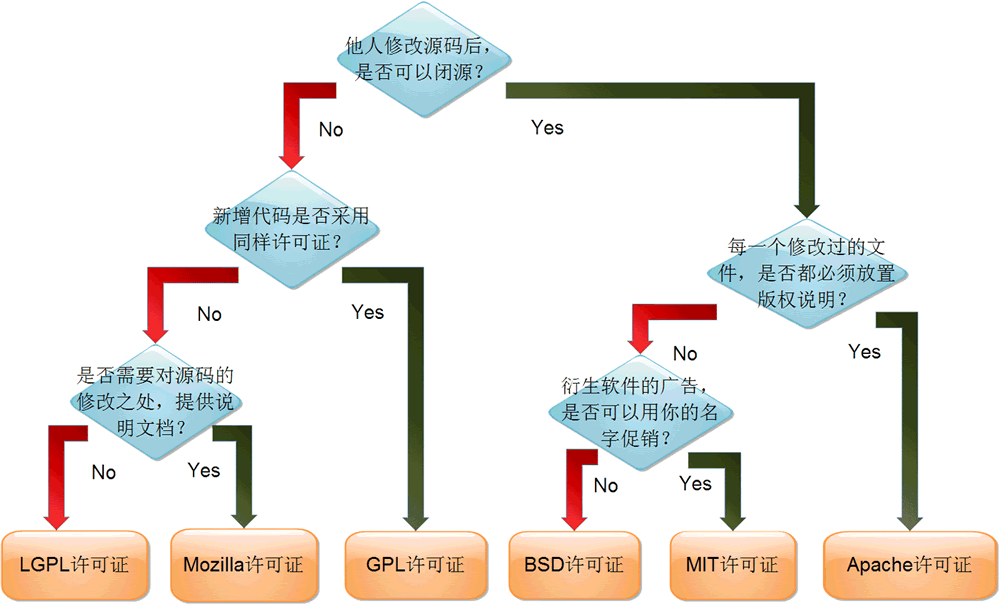
The open source agreement is what converts the code (project) into open source software; the open source agreement stipulates your rights and responsibilities when using open source software, that is, it stipulates what you can and cannot do. Although open source agreements do not necessarily have legal effect, they are also one of the most important pieces of evidence when it comes to software copyright disputes. Open source agreements often stipulate some specific terms. Only if these terms are met, the software can be used for commercial distribution.

#The operating environment of this tutorial: linux7.3 system, Dell G3 computer.
While pursuing "freedom", open source software cannot sacrifice the interests of programmers, otherwise it will affect programmers' creative passion. Therefore, there are now more than 60 open source promotion organizations (Open Source Initiative) in the world. Recognized open source license agreement to protect the rights of open source workers.
The open source agreement stipulates your rights and responsibilities when using open source software, that is, it stipulates what you can and cannot do What can be done. Although open source agreements do not necessarily have legal effect, they are also one of the most important pieces of evidence when it comes to software copyright disputes.
Simply put, an open source agreement is what transforms code (project) into open source software. An open source license can basically be regarded as a legal binding contract between the author of the open source dependency and the customer using the service, and the content of the constraint is the open source code. Open source agreements often stipulate some specific terms. Only if these terms are met, the software can be used for commercial distribution.
For developers who are preparing to write an open source software, it is also highly recommended to first understand the most popular open source license agreements and choose an appropriate open source license agreement to maximize the protection of their software rights.
Apache License
What is Apache License
Apache License (Apache License) is a free software license issued by the Apache Software Foundation. Apache License is a protocol adopted by the famous non-profit open source organization Apache.
This agreement is similar to BSD. It also encourages code sharing and the copyright of the final original author, and also allows source code modification and redistribution.
Apache License compliance conditions
The user of the code needs to be given an Apache License. If the code is modified, it needs to be stated in the modified file. Derived code (modifications and code derived from source code) must contain the agreements, trademarks, patent statements and other instructions specified by the original author that need to be included in the original code.
If a Notice file is included in the released product, the Apache License needs to be included in the Notice file. You can add your own license to the Notice, but it cannot appear to be a change to the Apache License.
Apache License is also a good license for commercial applications. Users can also modify the code when needed to meet their needs and publish/sell it as an open source or commercial product.
Apache License Benefits
BSD
What is BSD
BSD is the abbreviation of "Berkeley Software Distribution", which means " Berkeley Software Distribution".
BSD Open Source Agreement
BSD Open Source Agreement is an agreement that gives users a lot of freedom. You can use it freely, modify the source code, and re-release the modified code as open source or proprietary software.
When you publish code that uses the BSD protocol, or develop your own products based on the BSD protocol code, you need to meet three conditions:
If the re-released product contains source code, the BSD protocol in the original code must be included in the source code.
If you redistribute only binary class libraries/software, you need to include the BSD protocol in the original code in the documentation and copyright statement of the class library/software.
Do not use the name of the author/organization of the open source code and the name of the original product for marketing purposes.
BSD Rights
BSD code encourages code sharing, but the copyright of the code author needs to be respected.
BSD is a protocol that is friendly to commercial integration because it allows users to modify and redistribute code, and also allows commercial software to be released and sold using or developed on BSD code.
Many companies prefer the BSD protocol when choosing open source products, because they can fully control these third-party codes and can modify or re-develop them when necessary.
GPL
What is GPL
The full name of GPL is GNU General Public License, that is, GNU General Public License.
GPL protocol
Linux adopts the GPL protocol. The GPL agreement is very different from BSD, Apache License and other licenses that encourage code reuse.
The starting point of GPL is the open source/free use of code and the open source/free use of reference/modification/derivative code, but the modified and derived code is not allowed to be released and sold as closed source commercial software.
This is why we can use all kinds of free Linux, including Linux from commercial companies and various free software on Linux developed by individuals, organizations, and commercial software companies.
MIT
What is MIT
MIT is the same broad license agreement as BSD . MIT originates from Massachusetts Institute of Technology (MIT), also known as the X11 protocol.
MIT protocol
MIT is similar to BSD, but is more relaxed than the BSD protocol and is currently the least restrictive protocol. The only condition of this agreement is that the modified code or distribution package contains the original author's license information, which is applicable to commercial software.
Software projects using MIT include: jquery, Node.js.
There are hundreds of open source protocols in the world, and few people can completely understand the differences between them, even among the most popular Choosing among six open source licenses—GPL, BSD, MIT, Mozilla, Apache, and LGPL—is also complicated.
Ukrainian programmer Paul Bagwell drew an analysis diagram to explain how to choose an open source protocol. It is clear to everyone at a glance, which is really refreshing.

[Related recommendations:Programming Teaching]
| Benefits | Description |
|---|---|
| Once authorized, it is owned permanently. | |
| Authorized in one country, applies to all countries. If you are in the US and the license is from India, no problem. | |
| No royalties, no early or late fees. | |
| Anyone can obtain the license. | |
| Once authorized, no one can cancel it. For example, if you develop a derivative product based on the product code, you don't have to worry about being banned from using the code one day. |
The above is the detailed content of What is an open source agreement?. For more information, please follow other related articles on the PHP Chinese website!